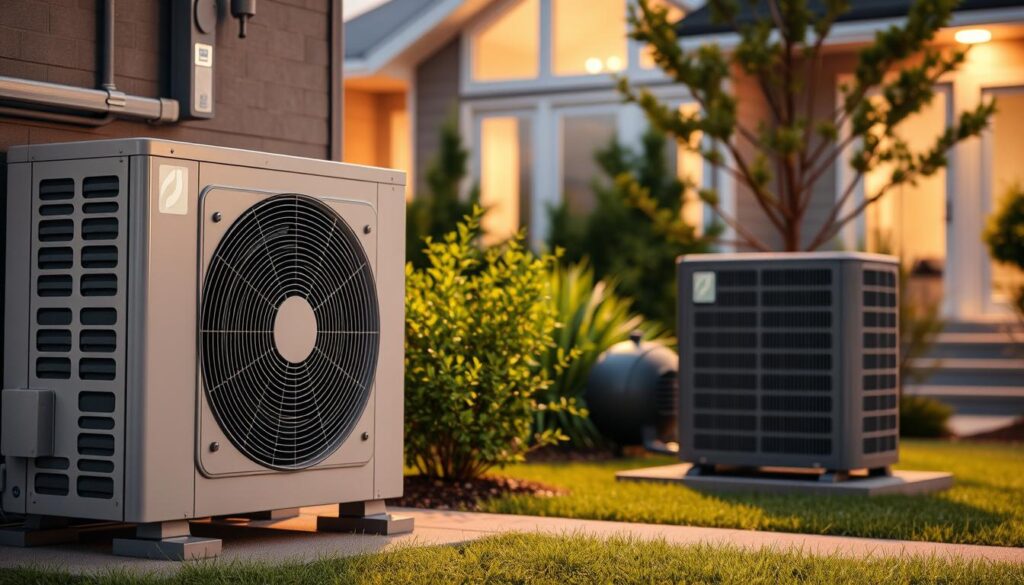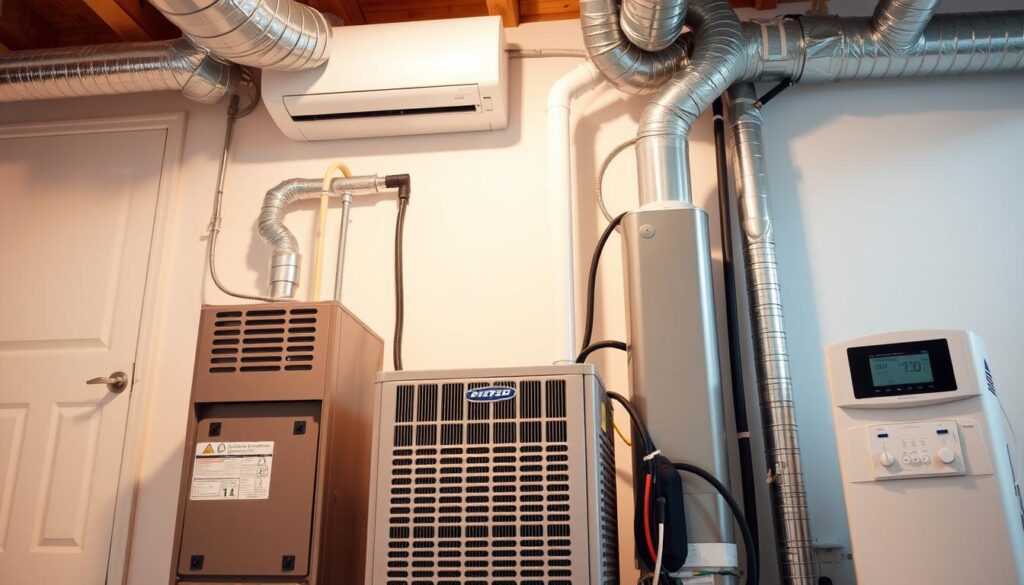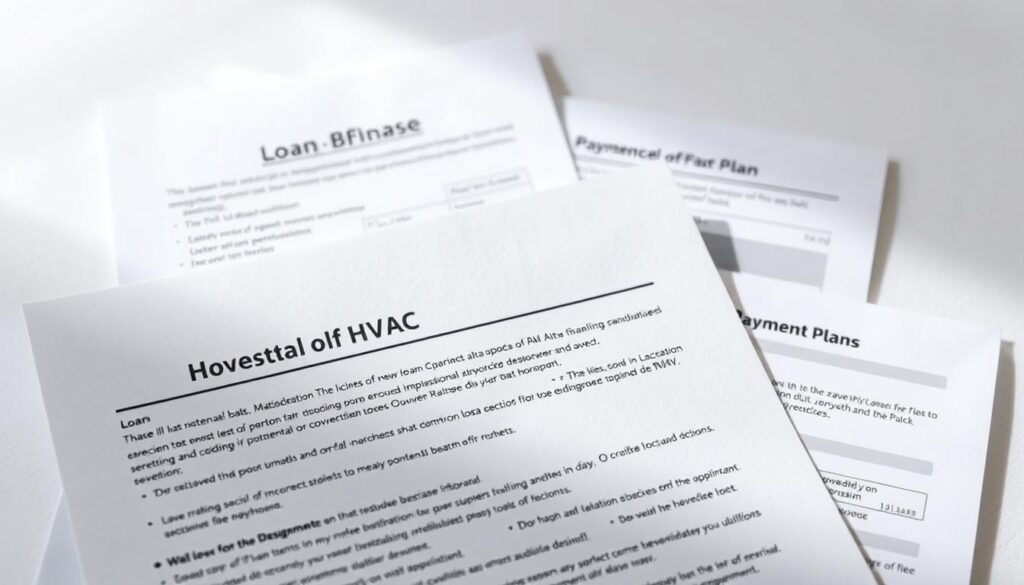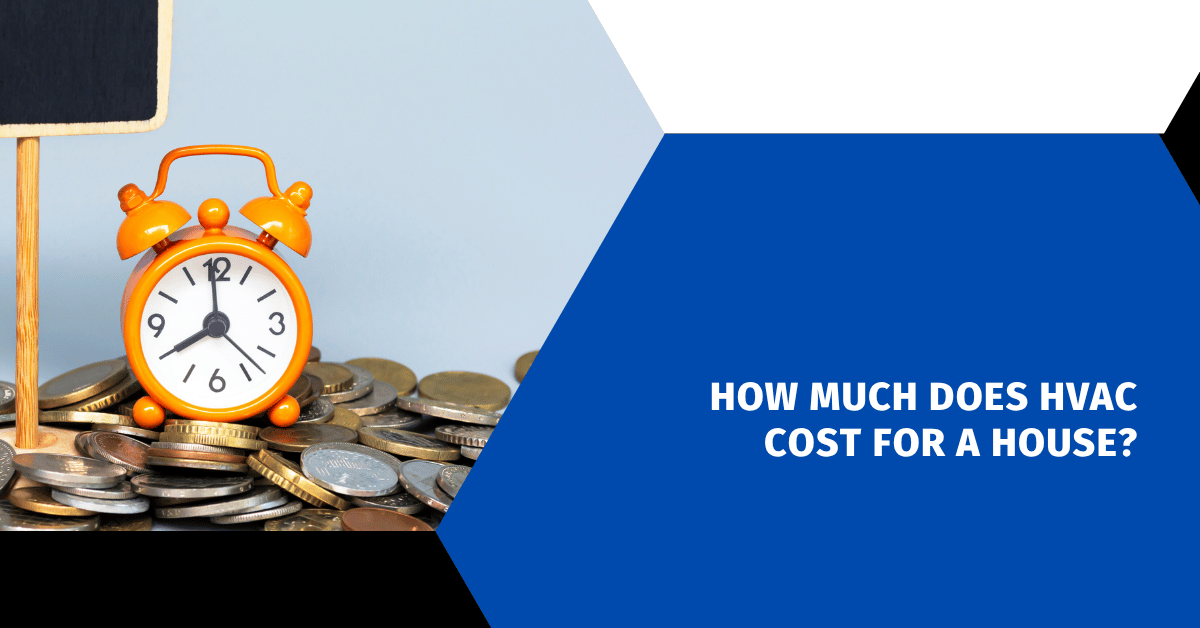Affiliate Disclosure
HVAC Guide Guys is a participant in the Amazon Services LLC Associates Program, an affiliate advertising program designed to provide a means for sites to earn advertising fees by advertising and linking to Amazon.
How Much Does HVAC Cost for a House? Are you curious about the cost of HVAC installation for your home? Knowing the costs of heating, ventilation, and air conditioning systems is key. It helps you make smart choices for your home’s comfort and energy use.

Homeowners usually spend between $5,000 and $12,500 on HVAC systems. The price changes based on your home’s size, the system’s complexity, and how energy-efficient it is.
Your HVAC system is a big investment in your home’s comfort and energy use. Choosing the right system means weighing the initial cost against long-term performance and energy savings.
Key Takeaways
- Average HVAC installation costs range between $5,000 and $12,500
- Costs depend on home size, system type, and efficiency ratings
- Energy-efficient systems may offer long-term cost savings
- Professional assessment is key for accurate pricing
- Think about both the initial cost and future energy expenses
Table of Contents
Average HVAC System Costs Overview
Understanding the cost of HVAC systems helps you choose wisely for your home’s comfort and budget. When looking at HVAC unit costs, many factors affect the total price.
A new HVAC system usually costs between $10,000 and $15,000 for standard homes. Your exact cost depends on several important factors.
Standard Efficiency Systems
Standard efficiency HVAC systems are a cost-effective way to control your home’s temperature. They offer good performance at a lower initial cost:
- Average price range: $6,000 – $10,000
- Typical SEER ratings between 13-15
- Suitable for moderate climate regions
- Lower initial investment
Premium Efficiency Systems
Premium efficiency systems are a more expensive option but offer advanced technology and better energy savings:
- Price range: $12,000 – $20,000
- SEER ratings of 16-26
- Significant long-term energy cost reductions
- Enhanced performance and comfort
Installation Labor Costs
Professional installation is key to your HVAC system’s total cost. Labor costs usually make up 30-50% of the total price, with rates from $75 to $250 per hour.
Investing in quality installation ensures optimal system performance and longevity.
Professional HVAC technicians will evaluate your home’s needs. They’ll suggest the right systems and ensure proper installation for the best efficiency.
Explore Our HVAC Shop
Looking for top-rated HVAC tools, parts, and accessories? Visit our shop and find the perfect solution for your needs.
Visit the ShopHow Much Does HVAC Cost for a House by Square Footage
Knowing how your home’s size affects HVAC costs is key when getting a new system. The size of your home decides what heating and cooling you’ll need. This, in turn, affects the cost.
The square footage of your home determines the HVAC system’s size. Costs vary based on your home’s size:
- Small homes (1,000-1,500 sq ft): 2-ton system
- Medium homes (1,500-2,500 sq ft): 2.5-3 ton system
- Large homes (2,500-3,500 sq ft): 3.5-5 ton system
Your HVAC system’s size must match your home’s square footage. A pro can help find the right size for your home. This ensures your system works well and saves energy.
| Home Size (sq ft) | HVAC System Size | Estimated Cost Range |
|---|---|---|
| 1,000-1,500 | 2-ton | $3,000-$5,000 |
| 1,500-2,500 | 2.5-3 ton | $4,500-$7,500 |
| 2,500-3,500 | 3.5-5 ton | $6,000-$10,000 |
Pro tip: Always talk to a licensed HVAC pro for a precise quote for your home’s heating and cooling needs.
Types of HVAC Systems and Their Costs
Choosing the right HVAC system is key to comfort and cost control. Different systems offer unique benefits and prices. This affects your home’s energy use and long-term costs.
When looking at HVAC costs, you’ll find three main types: central air, heat pumps, and furnaces. Each has its own benefits for homeowners wanting the best climate control.
Central Air Conditioning Systems
Central air is the top choice for cooling in American homes. Prices vary from $3,000 to $7,000, depending on your home’s size and needs.
- Ideal for cooling entire homes uniformly
- Requires existing ductwork
- Energy efficiency ratings between 13-21 SEER
Heat Pump Systems
Heat pumps are great for both heating and cooling, perfect for mild climates. They cost between $4,000 to $8,000.
- Provides both heating and cooling functions
- High energy efficiency
- Lower operational costs compared to traditional systems
Furnace Systems
Furnaces are a solid choice for heating, with prices from $2,500 to $6,000. Costs depend on fuel type and home size.
| System Type | Average Cost | Best For |
|---|---|---|
| Central Air | $3,000 – $7,000 | Large homes with existing ductwork |
| Heat Pump | $4,000 – $8,000 | Moderate climates, energy efficiency |
| Furnace | $2,500 – $6,000 | Primary heating in colder regions |
Choosing the right HVAC system is about considering your home’s needs, budget, and climate.
Explore Our HVAC Shop
Looking for top-rated HVAC tools, parts, and accessories? Visit our shop and find the perfect solution for your needs.
Visit the ShopHVAC Installation Cost Factors
Understanding the factors that affect home HVAC costs is key to making smart choices. Many elements influence the total cost, making it complex.
Your home’s features greatly impact HVAC system costs. Important factors include:
- Home square footage
- Existing ductwork condition
- Local climate requirements
- Energy efficiency ratings
- Structural home layout
Prices can vary a lot based on where you live. Contractors in different places charge differently due to local markets and demand. Prices also change with the seasons, going up in summer and winter.
| Cost Factor | Potential Price Impact |
|---|---|
| Home Size | $3,000 – $10,000 |
| Ductwork Complexity | $1,500 – $5,000 |
| Energy Efficiency Rating | $500 – $3,000 |
Talking to several HVAC experts can help you understand your costs better. Each home is different, so getting a custom quote is important for accurate pricing.
HVAC Brand Pricing Comparison
When looking at residential HVAC system prices, knowing the different brands is key. This knowledge helps you decide how much HVAC costs for a house. The HVAC market has many brands for all budgets and needs.
Choosing the right HVAC brand is about finding the right balance. You need to think about cost, quality, and how well it will last. Your choice affects both the upfront cost and future upkeep.
Premium Brands: Top-Tier Performance
Premium HVAC brands offer top-notch quality and the latest technology. They usually have:
- Highest energy efficiency ratings
- Extended warranty coverage
- Advanced technological features
Mid-Range Options: Balanced Performance
Mid-range HVAC brands offer reliable performance at a fair price. They aim to balance quality and cost for homeowners who want dependable systems.
| Brand | Price Range | Efficiency Rating |
|---|---|---|
| Carrier | $5,000 – $8,000 | Up to 21 SEER |
| Lennox | $4,500 – $7,500 | Up to 26 SEER |
| Rheem | $4,000 – $7,000 | Up to 20 SEER |
Budget-Friendly Choices
Budget-friendly HVAC brands offer basic cooling and heating at lower prices. Brands like Goodman are great for those on a tight budget.
- Lower initial investment
- Basic performance capabilities
- Shorter warranty periods
The cost of your residential HVAC system depends on several factors. These include your home’s size, the local climate, and how complex the installation is. Doing your research and getting advice from experts can help you choose the best brand for your home.
Explore Our HVAC Shop
Looking for top-rated HVAC tools, parts, and accessories? Visit our shop and find the perfect solution for your needs.
Visit the ShopAdditional Components and Their Costs
When thinking about a new HVAC system for your home, consider extra parts that boost performance and comfort. These upgrades can greatly improve air quality and make your HVAC system more efficient.

Several key components can change your home’s comfort and air quality:
- Air Purifiers: Capture dust, allergens, and pollutants
- Smart Thermostats: Optimize temperature and energy efficiency
- Humidifiers: Control indoor moisture levels
- Zone Control Systems: Customize temperature in different areas
Let’s look at the costs and benefits of these HVAC components:
| Component | Price Range | Key Benefits |
|---|---|---|
| Air Purifiers | $100 – $1,500 | Removes airborne contaminants, reduces allergies |
| Smart Thermostats | $100 – $500 | Energy savings, remote control, learning capabilities |
| Whole-Home Humidifiers | $300 – $1,000 | Improves air moisture, reduces respiratory issues |
| Zone Control Systems | $500 – $2,000 | Personalized temperature control, energy efficiency |
When figuring out the cost of a new HVAC system, remember that extra parts offer long-term benefits. Investing in quality upgrades can improve comfort, air quality, and potentially reduce energy expenses.
Pro tip: Consult with an HVAC professional to determine which components best suit your specific home needs and budget.
Ductwork Installation and Replacement Costs
Ductwork is key in your HVAC installation cost. It ensures your heating and cooling system works well. It also makes sure air is evenly spread in your home.
Ductwork costs about $10 to $20 per foot. The total cost to replace your hvac system’s ductwork depends on several things:
- Home square footage
- Complexity of home layout
- Duct material selection
- Local labor rates
New Ductwork Installation Essentials
Installing new ductwork needs careful planning. Experts will measure your home and plan the best air route. The cost for this ranges from $1,500 to $7,000.
Duct Material Options
| Material | Cost per Linear Foot | Durability |
|---|---|---|
| Flexible Ductboard | $1.50 – $3 | Low |
| Galvanized Steel | $5 – $10 | High |
| Aluminum | $4 – $7 | Medium |
Replacement Considerations
When looking at your hvac installation cost, think about these ductwork replacement signs:
- Visible damage or holes
- Inconsistent room temperatures
- Increased energy bills
- Age of existing ductwork (over 15 years)
“Proper ductwork is like the circulatory system of your home’s comfort” – HVAC Professional
Pro tip: Always get multiple quotes and inspect ductwork thoroughly before complete replacement to manage your overall HVAC system investment.
Explore Our HVAC Shop
Looking for top-rated HVAC tools, parts, and accessories? Visit our shop and find the perfect solution for your needs.
Visit the ShopHVAC Financing Options and Payment Plans

Many homeowners face challenges with the upfront costs of HVAC. Luckily, there are several financing options to help manage these costs. These options can make the average cost of HVAC for houses more affordable.
Your main financing choices are:
- HVAC Company Financing: Direct payment plans through your installation contractor
- Home Equity Loans: Leverage your home’s equity for lower interest rates
- Personal Loans: Unsecured options from banks or online lenders
- Credit Card Financing: 0% introductory rate cards for short-term coverage
Each financing option has its own benefits. HVAC company financing offers flexible terms and quick approval. Home equity loans have lower interest rates but use your home as collateral.
Here are more financial strategies to consider:
- Check utility company rebate programs
- Investigate federal tax credits for energy-efficient systems
- Compare interest rates across multiple lenders
- Evaluate your credit score before applying
Pro tip: Some manufacturers offer special financing for high-efficiency HVAC systems. This can lower your investment while improving comfort and energy savings.
Conclusion
Figuring out how much an HVAC system costs for a house involves looking at several factors. Getting a new HVAC system is more than just about comfort. It’s a smart choice that affects your home’s energy use and your wallet in the long run.
The cost of HVAC systems for homes can change a lot. It depends on what you need, how big your home is, and how complex the system is. Smart homeowners know that picking the right HVAC system is about weighing the upfront cost against long-term savings and higher home value. It’s wise to do your research and get quotes from different professionals.
When you’re looking at HVAC systems, think about how they’ll perform over time, not just the initial cost. A top-notch system might cost more at first but can save you money on energy and need fewer repairs. Getting it installed by pros, keeping it maintained, and choosing an energy-efficient model are smart moves.
Also, remember that a modern HVAC system can really boost your home’s value. In today’s real estate market, a well-working heating and cooling system can draw in buyers. It might even help you sell your home for more.
FAQ
What is the average cost of an HVAC system for a typical home?
How much does HVAC installation cost for different home sizes?
What factors most significantly impact HVAC system costs?
Are high-efficiency HVAC systems worth the extra cost?
How long do HVAC systems typically last?
What financing options are available for HVAC installations?
Do I need to replace ductwork when installing a new HVAC system?
What is the average cost of an HVAC system for a typical home?
How much does HVAC installation cost for different home sizes?
What factors most significantly impact HVAC system costs?
Are high-efficiency HVAC systems worth the extra cost?
How long do HVAC systems typically last?
What financing options are available for HVAC installations?
Do I need to replace ductwork when installing a new HVAC system?
FAQ
What is the average cost of an HVAC system for a typical home?
The cost of an HVAC system varies. It’s usually between ,000 and ,000. This depends on your home’s size, the type of system, and its efficiency. Other factors like your home’s square footage and the local climate also play a role.
How much does HVAC installation cost for different home sizes?
Costs change with home size:
– Small homes (1,000 sq ft): ,000 – ,000
– Medium homes (1,500-2,000 sq ft): ,000 – ,000
– Large homes (2,500-3,000 sq ft): ,000 – ,000
These prices consider the system type, efficiency, and local rates.
What factors most significantly impact HVAC system costs?
Several factors affect HVAC costs:
– Home size
– System type (central air, heat pump, furnace)
– Energy efficiency ratings
– Local climate
– Existing ductwork
– Brand and model
– Installation complexity
Are high-efficiency HVAC systems worth the extra cost?
High-efficiency systems cost more upfront. But, they can save 10-50% on energy bills. They also qualify for tax credits and rebates, making them a good long-term choice.
How long do HVAC systems typically last?
HVAC systems usually last 15-20 years with regular maintenance. Annual servicing can extend their life and keep them efficient. Usage, maintenance, and climate can affect their actual lifespan.
What financing options are available for HVAC installations?
You have several financing options:
– HVAC company payment plans
– Home equity loans
– Personal loans
– Credit card financing
– Energy-efficient home improvement loans
– Manufacturer and local utility rebates
Many contractors offer 0% interest financing for qualified buyers.
Do I need to replace ductwork when installing a new HVAC system?
Whether to replace ductwork depends on its condition. If it’s over 15 years old, damaged, or inefficient, you might need to replace it. Replacement costs range from
FAQ
What is the average cost of an HVAC system for a typical home?
The cost of an HVAC system varies. It’s usually between $5,000 and $12,000. This depends on your home’s size, the type of system, and its efficiency. Other factors like your home’s square footage and the local climate also play a role.
How much does HVAC installation cost for different home sizes?
Costs change with home size:
– Small homes (1,000 sq ft): $3,000 – $5,000
– Medium homes (1,500-2,000 sq ft): $5,000 – $9,000
– Large homes (2,500-3,000 sq ft): $8,000 – $15,000
These prices consider the system type, efficiency, and local rates.
What factors most significantly impact HVAC system costs?
Several factors affect HVAC costs:
– Home size
– System type (central air, heat pump, furnace)
– Energy efficiency ratings
– Local climate
– Existing ductwork
– Brand and model
– Installation complexity
Are high-efficiency HVAC systems worth the extra cost?
High-efficiency systems cost more upfront. But, they can save 10-50% on energy bills. They also qualify for tax credits and rebates, making them a good long-term choice.
How long do HVAC systems typically last?
HVAC systems usually last 15-20 years with regular maintenance. Annual servicing can extend their life and keep them efficient. Usage, maintenance, and climate can affect their actual lifespan.
What financing options are available for HVAC installations?
You have several financing options:
– HVAC company payment plans
– Home equity loans
– Personal loans
– Credit card financing
– Energy-efficient home improvement loans
– Manufacturer and local utility rebates
Many contractors offer 0% interest financing for qualified buyers.
Do I need to replace ductwork when installing a new HVAC system?
Whether to replace ductwork depends on its condition. If it’s over 15 years old, damaged, or inefficient, you might need to replace it. Replacement costs range from $1,500 to $7,000, based on your home’s size and complexity.
How can I reduce my HVAC installation costs?
To lower costs:
– Get quotes from reputable contractors
– Install during off-peak seasons
– Choose mid-range efficiency systems
– Use rebates and tax credits
– Ensure proper system sizing
– Maintain your current system to delay replacement
,500 to ,000, based on your home’s size and complexity.
How can I reduce my HVAC installation costs?
To lower costs:
– Get quotes from reputable contractors
– Install during off-peak seasons
– Choose mid-range efficiency systems
– Use rebates and tax credits
– Ensure proper system sizing
– Maintain your current system to delay replacement

